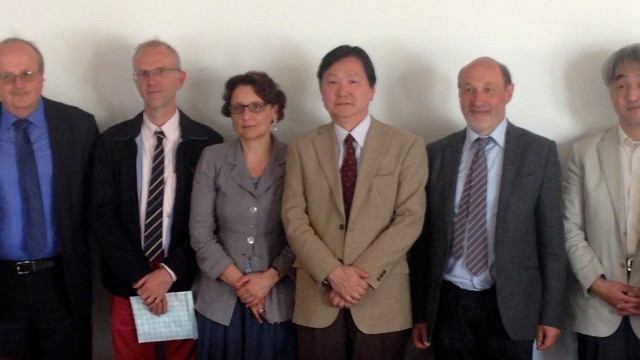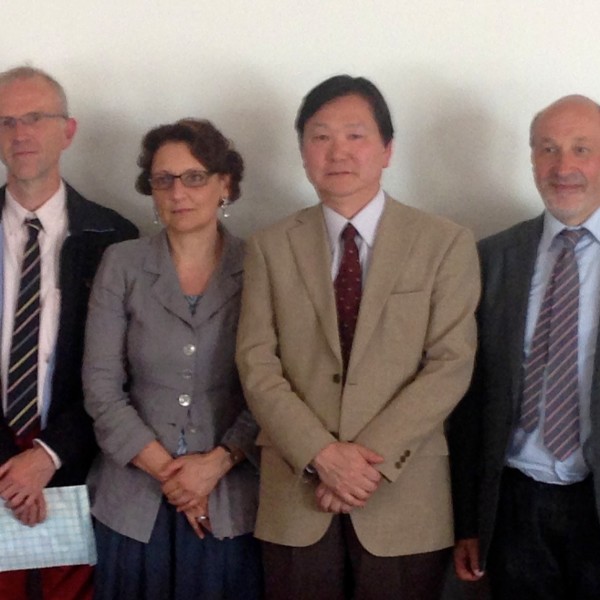
Accueil d’une délégation japonaise
Accueil d’une délégation d’avocats du barreau de Tokyo
Le jeudi 5 juin 2014 la Chaire d’excellence Gestion du conflit et de l’après-conflit a reçu une délégation japonaise composée de six avocats du barreau de Tokyo. Tous ont été engagés dans le procès dit de Pingdingshan.
C’est dans cette petite ville de la province du Henan en Chine que des troupes de l’Armée impériale japonaise ont massacré le 16 septembre 1932 plus de 3000 habitants, hommes, femmes et enfants.
En 1996, trois survivants ont entrainé une procédure judiciaire contre l’Etat japonais. Les procès ont été perdus mais des associations de juristes et d’universitaires militent aujourd’hui pour que le Gouvernement japonais reconnaisse les faits et verse des dédommagements. Les ayant-droits des victimes de Pingdingshan demandent des réparations qui prendrait la forme du financement d’un Parc de la Paix pour transmettre la mémoire de ce massacre aux jeunes générations.
A la suite de cette visite, la Chaire d’excellence et Maître Shiroh Kawakami qui conduisait la délégation se sont engagés à nouer des relations plus étroites afin, côté japonais de fournir des archives et de la documentation sur les 88 procès en cours au Japon (procès se rapportant aux « femmes de réconfort », à l’utilisation d’armes chimiques, aux massacres des années 1930 en Chine), et côté Chaire à constituer un dossier sur la gestion mémorielle des guerres en Europe (autres interprétations, d’évocations, mémoriaux, musées de la Seconde Guerre mondiale).
The Outline of the Pingdingshan Massacre
The Pingdingshan massacre was a massacre committed by the Imperial Japanese Army on Septembre, 16, 1932 in the Pingdingshan Settlement located in the outskirts of Fushun, a city known for its coal mines, in northeastern China. More than three thousand non-combatants, including childrens, women and old people, were killed in the massacre.
On the previous night (September 15), groups of Anti-Japanese Army went through the Pingdingshan Settlement and attacked the Japanese-operated coal mine of Fushun. The raid inflicted a great loss to the Japanese colonizers. Blaming the residents of the Pingdingshan Settlement for not having reported the passing of the Anti-Japanese Army to the police, the Japanese Army decided to kill all the residents in retaliation and executed the decision.
On September 16, the Japanese military men arrived in the Pingdingshan Settlement by truck, herded all the residents to the bottom of a cliff west to the settlement, and barraged machine-gun fires. Those who survived the macine gun-fires were killed by bayonets.Finally, they blew up the cliff with dynamite and buried the scene. They also set fire on the settlement of Pingdingshan and destroyed it.
The site of the massacre remained buried until the end of Worl War II. When the site was excavated after the war, number of bodily remains of the massacred residents appeared. Today, a memorial hall is built on the site and the bodily remains are preserved there.
The japanese government has neither admitted the Pingdingshan massacre nor apologized, In 1996, from among those who miraculously survived the massacre, three Chinese named Mo Tesheng, Yang Baoshan and Fang Surong filed a compensation lawsuit against the Japanese government at the Tokyo District Court in Japan.
The Tokyo District Court acknowledge in its decision the facts regarding the Pingdingshan massacre. Howevern the court dismissed the demands of the three plaintiffs by insisting that the principle of immune sovereignty, according to which the state is immune from compensation claims for damages caused by its exercise of power, was applicable to the Japanese government of the time when the Pingdingshan massacre was committed. Although the plaintiffs appealed to the upper courts, the case was concludedwhen the Suprem Court of Japan dismissed their appeal in 2006.
Although they lost their case, the three survivors have been making out-of-court demands that the Japonese should acknowledge the facts and apologize, build a monument and a cemetryas a token of apology, reveal more facts regarding the massacre and pass o the lessons for future générations in order not to repeat the tragedy of Pingdingdhan massacre.
To achieve these goals demanded by the victims, Japanese and Chinese citizens are engaging in transnational coopération, and in so doing have developed mutual understanding and trust. We firmly believe that such mutual trust at the grass-root level will be the foundation on which to buid genuinely peaceful and a stable societies in the future.
We have comme to learn about the Distoma Massacre, thaht in Europe, as well, somme people are incerely confrontingin the historical fact of a massacre of civilians. Altough the areas we live in – Asia and Europe – are separate, it is very important that we, linving as contemporaries who confront similar cases of massacre committed in the past, share our pledges not to repeat the by passing on our memories and lessons.
A massacre of non-combatant civilans is a grave violation of Human rights. No matter how much time has lapsed, redress must be provided to the victims. Only in achieving this goal, we can go a step further to build societies where Human Rights are truly protected. We are firmly determined to continue to take transnational concerted actions at the grass-root level.

Délégation japonaise, Faculté de droit et des sciences économiques de Limoges © IiRCO
5 rue Félix Eboué - 87 031 Limoges - France
Tél. : +33 (0)5 55 14 92 34
chaire-gcac@unilim.fr
